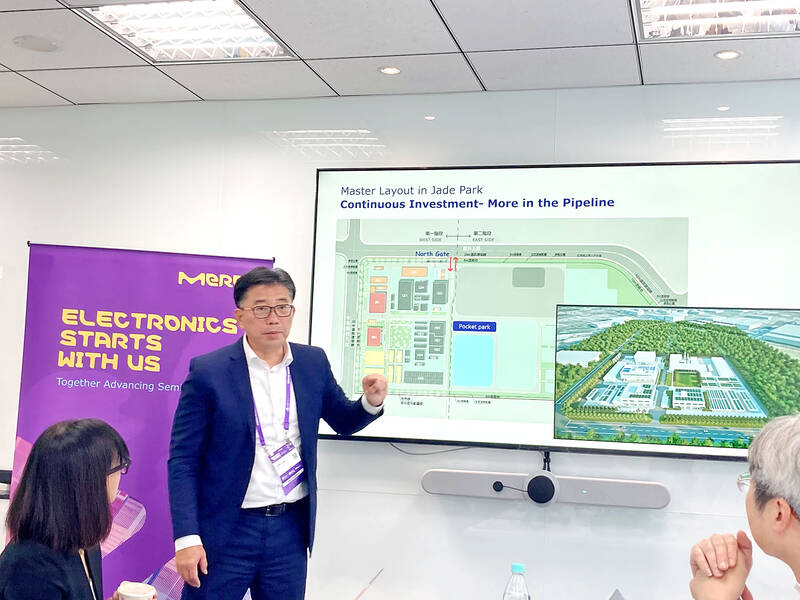Merck Group on Wednesday said it plans to introduce more key semiconductor materials used in cutting-edge semiconductor manufacturing technologies after a new facility in Kaohsiung’s Lujhu District (路竹) starts operations next year, further boosting the company’s product localization rate.
The company has since 2019 increased local sourcing in Taiwan and relocated production from other countries like the US, Europe and some Asian countries in response to customers’ demand and geopolitical risks.
As of the end of July, more than 50 percent of Merck’s semiconductor products were sourced from local suppliers, Merck Group in Taiwan managing director John Lee (李俊隆) told a media briefing in Taipei.

Photo: Lisa Wang, Taipei Times
Among the broad semiconductor material portfolios, specialty gases had the highest localization rate of 66 percent, followed by thin-film products’ 54 percent, Merck data showed.
The company is stepping up product localization to cope with major semiconductor customers’ shifting to more advanced technologies from 7-nanometer to 5-nanometer and even to 1.6-nanometer process nodes, Lee said.
“We plan to introduce novel materials, which will be in production for the first time in Taiwan, and allocate production of some existing materials from neighboring countries when the new plant is completed,” Lee said.
Those new materials are likely to be used in the thin-film deposition process for the advanced technology nodes, Lee said.
Merck also plans to expand the supply of specialty gases for doping, cleaning and etching in particular, he said.
The new plant is a part of Merck’s “Level Up” program for its electronics business, with investment totaling more than 3 billion euros (US$3.33 billion) by next year. Merck has earmarked an investment of NT$17 billion (US$530 million) in Taiwan.
When asked if the locally made semiconductor materials could address the surging demand for artificial intelligence (AI) chips, Merck KGaA executive vice president Suresh Rajaraman said: “As advanced technologies are used for AI, so you can say the investment we are making is to enable AI.”
Producing AI chips with strong computing power and energy efficiency requires more new and complex materials, Rajaraman said.
Merck has used about 25 percent of elements on the periodic table to invent new materials, Rajaraman said.
Any existing non-radioactive element is “in play,” he said.

WEAKER ACTIVITY: The sharpest deterioration was seen in the electronics and optical components sector, with the production index falling 13.2 points to 44.5 Taiwan’s manufacturing sector last month contracted for a second consecutive month, with the purchasing managers’ index (PMI) slipping to 48, reflecting ongoing caution over trade uncertainties, the Chung-Hua Institution for Economic Research (CIER, 中華經濟研究院) said yesterday. The decline reflects growing caution among companies amid uncertainty surrounding US tariffs, semiconductor duties and automotive import levies, and it is also likely linked to fading front-loading activity, CIER president Lien Hsien-ming (連賢明) said. “Some clients have started shifting orders to Southeast Asian countries where tariff regimes are already clear,” Lien told a news conference. Firms across the supply chain are also lowering stock levels to mitigate

IN THE AIR: While most companies said they were committed to North American operations, some added that production and costs would depend on the outcome of a US trade probe Leading local contract electronics makers Wistron Corp (緯創), Quanta Computer Inc (廣達), Inventec Corp (英業達) and Compal Electronics Inc (仁寶) are to maintain their North American expansion plans, despite Washington’s 20 percent tariff on Taiwanese goods. Wistron said it has long maintained a presence in the US, while distributing production across Taiwan, North America, Southeast Asia and Europe. The company is in talks with customers to align capacity with their site preferences, a company official told the Taipei Times by telephone on Friday. The company is still in talks with clients over who would bear the tariff costs, with the outcome pending further

Six Taiwanese companies, including contract chipmaker Taiwan Semiconductor Manufacturing Co (TSMC, 台積電), made the 2025 Fortune Global 500 list of the world’s largest firms by revenue. In a report published by New York-based Fortune magazine on Tuesday, Hon Hai Precision Industry Co (鴻海精密), also known as Foxconn Technology Group (富士康科技集團), ranked highest among Taiwanese firms, placing 28th with revenue of US$213.69 billion. Up 60 spots from last year, TSMC rose to No. 126 with US$90.16 billion in revenue, followed by Quanta Computer Inc (廣達) at 348th, Pegatron Corp (和碩) at 461st, CPC Corp, Taiwan (台灣中油) at 494th and Wistron Corp (緯創) at

NEGOTIATIONS: Semiconductors play an outsized role in Taiwan’s industrial and economic development and are a major driver of the Taiwan-US trade imbalance With US President Donald Trump threatening to impose tariffs on semiconductors, Taiwan is expected to face a significant challenge, as information and communications technology (ICT) products account for more than 70 percent of its exports to the US, Chung-Hua Institution for Economic Research (CIER, 中華經濟研究院) president Lien Hsien-ming (連賢明) said on Friday. Compared with other countries, semiconductors play a disproportionately large role in Taiwan’s industrial and economic development, Lien said. As the sixth-largest contributor to the US trade deficit, Taiwan recorded a US$73.9 billion trade surplus with the US last year — up from US$47.8 billion in 2023 — driven by strong